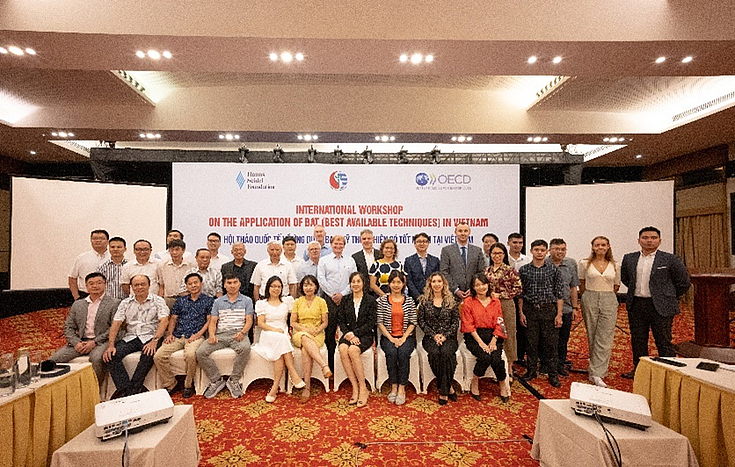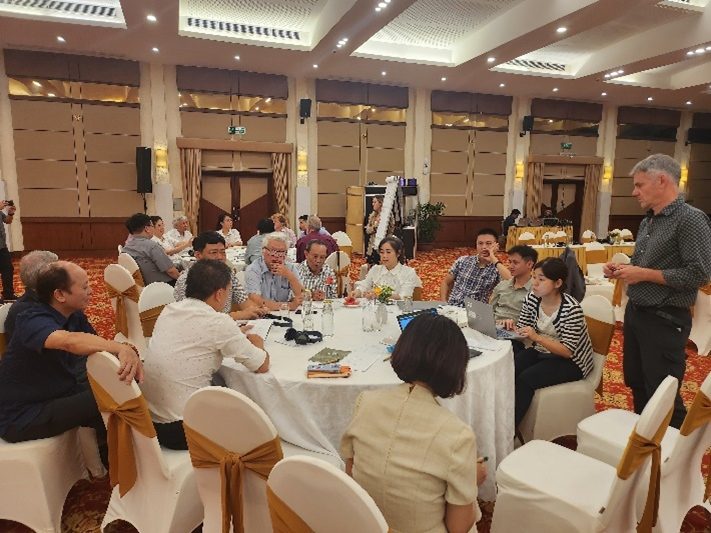Best available techniques (BAT)
International Workshop on The Application of BAT In Vietnam
Participants of the workshop are representatives of MoNRE, associations, research institutions, HSF Vietnam, OECD and other international organizations.
HSF
The workshop's agenda was crafted to aid relevant BAT (Best Available Techniques) officials of the Ministry of Natural Resources and Environment (MoNRE) in establishing a nationwide BAT approach, offering technical insights into the paper and pulp production, as well as the iron and steel sectors. The MoNRE delegation, comprised of experts responsible for building an regulatory framework for implementing Vietnamese legislation, outlined the goal of adopting a set of BAT Conclusions per sector or industrial process by 2027 to 2029. Presentations by the Deputy Director General of MoNRE, Mr Nguyen Thuong Hien, elucidated Vietnam's recently adopted environmental legislation, while the Vietnam Paper and Pulp Association (VPPA) provided an overview of the sector's status quo.
The workshop featured technical contributions from the OECD BAT Secretariat and delegates from agencies in the UK, Germany, and Korea, addressing various facets of the BAT concept and sector-specific considerations. The first day emphasized understanding the establishment of a BAT approach, delving into regulatory responsibilities supported by examples from the EU's Industrial Emissions Directive (IED) and Korea. It underscored the importance of stakeholder engagement and communication with the industry for a participatory approach in shaping the national BAT approach.
Development of BAT Action Plan for Vietnam
HSF
Delegations presented diverse methods for identifying and assessing BAT options, offering a foundational framework for MoNRE's BAT team, along with insights from the BAT-Reference Documents (BREF) from the EU and Korea. The second day comprised sector-specific sessions focusing on paper-pulp and iron-steel, providing comprehensive information gleaned from practices in the UK, Korea, and the EU. This day also addressed critical aspects related to developing effective delivery, environmental permitting, monitoring, and compliance mechanisms for a nationwide BAT implementation. Discussions and Q&A sessions were frequent, fostering clarity on points presented and addressing challenges MoNRE faces in progressing toward a national BAT approach. Additionally, the second day delved into financial mechanisms and incentives to support BAT adoption by the industry. Furthermore, in each session, there were frequent discussions and question-and-answer sessions to further clarify points presented or correspond to issues that MoNRE is facing in their progress towards adopting a national BAT approach.
Hanns Seidel Foundation Vietnam would like to express sincere gratitude to all the esteemed experts who contributed to the success of this workshop. A special note of appreciation goes out to colleagues from the Organization for Economic Co-operation and Development (OECD), Umweltbundesamt, the Environment Agency of the UK, and the National Institute of Environmental Research of Korea. Their insights and collaborative spirit have significantly enriched the BAT implementation roadmap in Vietnam.


